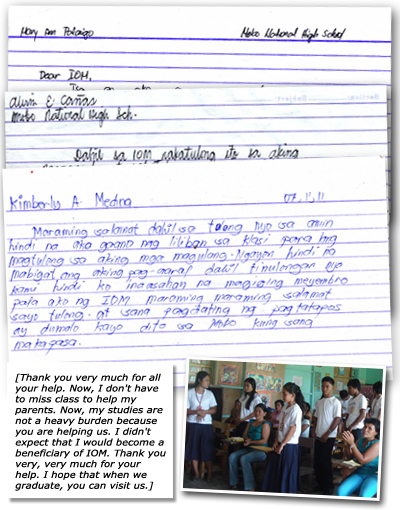Kimberly Medina, a student at Mobo National High School in Masbate, Philippines, sits at her desk listening attentively to her teacher. Every school day, she pays Php 50 (USD 1.18) for a ride on a habal-habal (a local motorcycle-taxi carrying three or more passengers) before having to walk another hour to school. The opportunity to make the trip is welcome though. Many times, Kimberly's seat at school would remain empty because her parents didn't have enough money for her transportation fare.
For many students at Mobo National High School, staying in school is a challenge. The cost of transportation, school materials such as notebooks, pencils, paper for projects and other fees force many students to miss classes. Most are children of farmers and fishermen – low income and daily wage earning families – for whom every centavo counts. When the choice comes down to using valuable funds to feed the family or send their child to school for the day, education often takes the backseat to a rumbling stomach.
In other cases, the burden of sending children to school becomes too great, and many youths must drop out to help their parents in the farms or to find work in urban centres, usually as domestic workers or laborers. Unprepared, they become vulnerable to exploitation, cannot compete with other applicants or become trapped in low paying jobs where they have no bargaining power to ask for better wages and conditions.
Masbate province lies in the centre of the Philippine archipelago. Its serene surroundings belie a struggle for survival. Like many other provinces in the country, it has seen an exodus of Filipinos seeking greener pastures abroad or in larger cities in the country.
The Philippines has a dominantly young population with more than a third below 15 years of age and a high national secondary school drop out rate. Many young people say they have to abandon their education because they don’t have enough money to pay for transportation costs, school meals or projects. Young boys in poverty-stricken provinces are especially vulnerable because they are often pressured to help support their families as soon as possible.
"Filipino youth see OFW success stories and become overexcited to join the labour market. They leave school as soon as they're physically able to work," said Ricardo Casco, IOM Labour Migration Specialist. "But the labour market prefers seasoned, skilled workers. Overseas employment is not for fresh graduates, much less dropouts. IOM is helping in terms of scholarships and by advocating the inclusion of migration issues into the high school curricula. This will help Filipino youth make informed decisions on migration. The purpose of the intervention is to help the poverty situation by encouraging youth to stay in school."
–Ricardo Casco, IOM Philippines Labour Migration Specialist
To encourage young Filipinos, particularly those living in provinces that see heavy migration outflows, to finish their education, IOM Philippines and the Overseas Workers Welfare Administration (OWWA) co-implemented the education subsidy component of the Joint Programme on Alternatives to Migration: Decent Jobs For Filipino Youth. The Joint Programme which focuses on the Youth, Employment, and Migration thematic window is currently being run by IOM together with other UN Country Team members, namely: International Labor Organization (ILO), United Nations Children's Fund (UNICEF), and United Nations Population Fund (UNFPA). It is supported by the Spanish government through the Millennium Development Goals Fund (MDG-F).
For school year 2010-2011, IOM and OWWA started with 288 student beneficiaries from four of the country's poorest provinces – Masbate, Antique, Maguindanao and Agusan del Sur. For this year, the number of student beneficiaries increased to 450 pupils coming from 15 beneficiary schools.
Through the subsidy, each beneficiary receives a P1,000 monthly allowance. Participating schools meantime receive a P500 one-time miscellaneous fee for each of the beneficiaries to cover school fees. In addition, student beneficiaries are eligible to receive special assistance in terms of medical assistance, remedial classes and psychosocial support.
In exchange, students and their parents who fall under the programme sign commitment letters where parents agree to let their children finish school instead of pushing them to find work or to skip school to help in harvest time. Students, meantime, agree to attend their classes. Unlike other scholarship programmes, students do not have to meet a minimum grade point average. They must simply finish school.
"Thank you very much for all your help. Now, I don't have to miss class to help my parents. Now, my studies are not a heavy burden because you are helping us," writes Kimberly in a letter to IOM.
The joint programme also hopes to localize youth employment migration policies and programmes through one stop resource and support centres, strengthen public and private partnerships to develop alternative employment and services for youth, increase services for youth, enhance technical and vocational skills training and develop more inclusive flexible secondary education for youth.
Through these initiatives, impoverished Filipino youth will be encouraged to complete their education and maximize their potential instead of selling themselves short.
It begins by making sure that there are no more empty seats in classrooms.
For more information, please contact Ricardo Casco, IOM Philippines, rcasco@iom.int

Some of the letters written by student beneficiaries from Mobo National High School in Masbate, Philippines. Inset: Student beneficiaries with parents during the awarding ceremonies of the programme. © IOM 2010